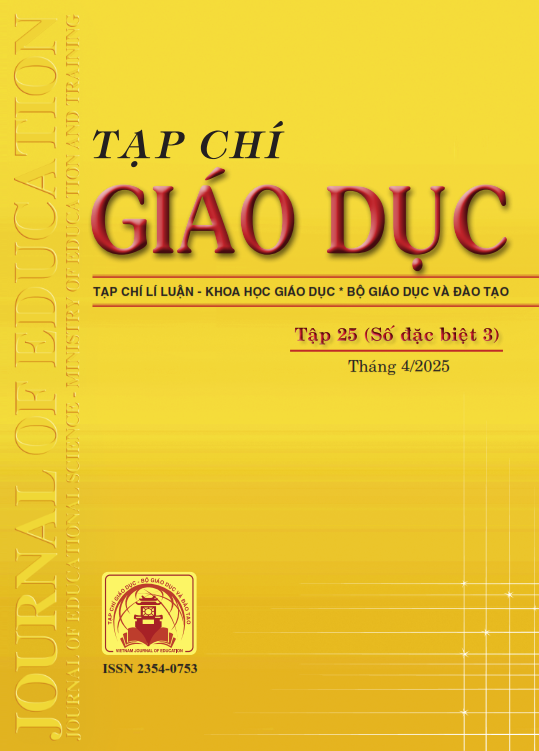Ứng dụng trí tuệ nhân tạo trong giáo dục vào dạy học kĩ thuật nhằm tăng tính tương tác và số hóa
Tóm tắt
Technology and the 5.0 Revolution have made AI a crucial element in education, enhancing the learning experience through intelligent systems. AI not only automates administrative tasks for educators but also creates personalized “learning profiles” for each student, addressing individual learning needs and pacing. This paper analyzes and highlights the applications of Artificial Intelligence in Education (AIE) in teaching and technical education. Based on an assessment of AIE’s effectiveness in technical teaching, the study examines its impact on instructors and the extent to which it enhances student interaction and digitalization at the University of Hong Kong. The findings indicate that AI improves lesson quality, professional skills, and instructional design capabilities of educators, receiving high ratings from both instructors and students. Additionally, AI facilitates personalized education, enabling flexible teaching methods and continuous assessment, allowing educators to adjust content to better suit learners. To maximize AI’s potential, this paper also emphasizes the necessity of equipping students with fundamental AI knowledge to prepare them for a digitalized future.
Tài liệu tham khảo
Ahmad, M. F., & Ghapar, W. R. G. W. A. (2019). The era of artificial intelligence in Malaysian higher education: Impact and challenges in tangible mixed-reality learning system toward self exploration education (SEE). Procedia Computer Science, 163, 2-10.
Alshahrani, B. T., Pileggi, S. F., & Karimi, F. (2024). A Social Perspective on AI in the Higher Education System: A Semisystematic Literature Review. Electronics, 13(8), 1572.
Bajaj, R., & Sharma, V. (2018). Smart Education with artificial intelligence based determination of learning styles. Procedia Computer Science, 132, 834-842. https://doi.org/10.1016/j.procs.2018.05.095
Chen, L., Chen, P., & Lin, Z. (2020). Artificial intelligence in education: A review. Ieee Access, 8, 75264-75278.
Deb, K., Banerjee, S., Chatterjee, R.P., Das, A., Bag, R. (2019). Educational website ranking using fuzzy logic and k-means clustering based hybrid method. Ingénierie des Systèmes d’Information, 24(5), 497-506. https://doi.org/ 10.18280/isi.240506
Goksel, N., & Bozkurt, A. (2019). Artificial intelligence in education: Current insights and future perspectives. In Handbook of Research on Learning in the Age of Transhumanism (pp. 224-236). IGI Global.
Goralski, M. A., & Tan, T. K. (2020). Artificial intelligence and sustainable development. The International Journal of Management Education, 18(1), 100330. https://doi.org/10.1016/j.ijme.2019.100330
Holstein, K., McLaren, B. M., & Aleven, V. (2019). Co-designing a real-time classroom orchestration tool to support teacher-AI complementarity. Grantee Submission.
Hurix Digital (2023). AI Benefits in Education: 5 Ways AI Can Help You Increase Student Engagement. https://www.hurix.com/ai-benefits-in-educationways-ai-can-help-you-increase-student-engagement/
Ivanashko, O., Kozak, A., Knysh, T., & Honchar, K. (2024). The role of artificial intelligence in shaping the future of education: opportunities and challenges. Futurity Education, 4(1), 126-146.
Kamdar, I., Ali, S., Bennui, A., Techato, K., & Jutidamrongphan, W. (2019). Municipal solid waste landfill siting using an integrated GIS-AHP approach: A case study from Songkhla, Thailand. Resources, Conservation and Recycling, 149, 220-235. https://doi.org/10.1016/j. resconrec.2019.05.027
Li, W., Zhang, X., Li, J., Yang, X., Li, D., & Liu, Y. (2024). An explanatory study of factors influencing engagement in AI education at the K-12 Level: an extension of the classic TAM model. Scientific Reports, 14(1), 13922. https://doi.org/10.1038/s41598-024-64363-3
Meng, N., Dhimolea, T. K., & Ali, Z. (2022). AI-enhanced education: Teaching and learning reimagined. In Bridging human intelligence and artificial intelligence (pp. 107-124). Cham: Springer International Publishing.
Moussaoui, F., Cherrared, M., Kacimi, M. A., & Belarbi, R. (2018). A genetic algorithm to optimize consistency ratio in AHP method for energy performance assessment of residential buildings - Application of top-down and bottom-up approaches in Algerian case study. Sustainable Cities and Society, 42, 622-636. http://doi.org/ 10.1016/j.scs.2017.08.008
Nguyen, A., Kremantzis, M., Essien, A., Petrounias, I., & Hosseini, S. (2024). Enhancing student engagement through artificial intelligence (AI): Understanding the basics, opportunities, and challenges. Journal of University Teaching and Learning Practice, 21(06).
Phạm Tất Thành (2024). Đánh giá kết quả phản hồi của Chatbot Bard trong thực hiện bài thi môn Địa lí kì thi tốt nghiệp trung học phổ thông Quốc gia Việt Nam từ năm 2019 đến năm 2023. Tạp chí Giáo dục, 24(4) 35-40.
Schmidt, J. T., & Tang, M. (2020). Digitalization in education: challenges, trends and transformative potential. Führen und managen in der digitalen transformation: trends, best practices und herausforderungen, 287-312.
Shiohira, K., & Keevy, J. (2020). Virtual Conference on Artificial Intelligence in Education and Training: Virtual Conference Report. UNESCO-UNEVOC TVeT Forum, 11 to 15 November 2019. UNESCO-UNEVOC International Centre for Technical and Vocational Education and Training.
Shukla, A. K., Janmaijaya, M., Abraham, A., & Muhuri, P. K. (2019). Engineering applications of artificial intelligence: A bibliometric analysis of 30 years (1988-2018). Engineering Applications of Artificial Intelligence, 85, 517-532. https://doi.org/10.1016/j.engappai.2019.06.010
Vincent-Lancrin, S., & Van der Vlies, R. (2020). Trustworthy artificial intelligence (AI) in education: Promises and challenges.
Xu, Z. (2024). AI in education: Enhancing learning experiences and student outcomes. Applied and Computational Engineering, 51(1), 104-111.
Yamada, A. (2021). Japanese Higher Education: The Need for STEAM in Society 5.0, an Era of Societal and Technological Fusion. Journal of Comparative and International Higher Education, 13(1), 44-65.
Zhang, W., & Zhang, E. (2019). RETRACTED: Application of Neural Network Machine Translation in College Translation Teaching. International Journal of Emerging Technologies in Learning (Online), 14(19), 16. https://doi.org/10.3991/ijet.v14i19.10690
Zhou, M.Y. (2020). Opportunities, Challenges and Countermeasures: Teaching Reform in the Age of Artificial Intelligence. Modern Education Management, 2020(3), 110-116.
Đã Xuất bản
Cách trích dẫn
Số
Chuyên mục
Giấy phép

Tác phẩm này được cấp phép theo Ghi nhận tác giả của Creative Commons Giấy phép quốc tế 4.0 .












